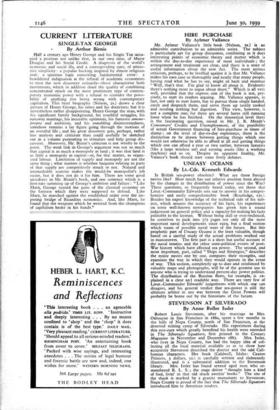CURRENT LITERATURE
SINGLE-TAX GEORGE • By Arthur Birnie Half a century ago Henry George and his Single Tax occu- pied a position not unlike that, in our own time, of Major Douglas and his Social Credit. A diagnosis of the world's economic and social ills, and a corresponding cure, of attrac- tive simplicity : a popular backing inspired by almost religious zeal : a specious logic concealing fundamental error : a bewildered indignation at the refusal of academic economists to treat the new discovery seriously—these characterise both movements, which in addition share the quality of combining concentrated attack on the most prominent type of contem- porary economic power with a refusal to consider the possi- bility of anything else being wrong with contemporary capitalism. This brief biography (Nelson, 2s.) draws a clear picture of Henry George, his times and his doctrines; but it is nevertheless rather disappointing. Henry George the man, with his significant family background, his youthful struggles, his runaway marriage, his incurable optimism, his fantastic amour- propre and ambition, and his ennobling disinterestedness, somehow remains a lay figure going through the motions of an eventful life ; and his great discovery gets, perhaps, rather less analysis and criticism than could usefully be sketched out in a volume purporting to stimulate and help group dis- cussion. Moreover, Mr. Birnie's criticism is not wholly to the point. The weak link in George's argument was not so much that capital is as much a monopoly as land ; it was that land is as little a monopoly as capital—or, for that matter, as organ- ised labour. Limitation of supply and monopoly are not the same thing ; what matters is whether bargains relating to parts of that supply are competitively struck or not. Natural and irremediable scarcity makes the would-be monopolist's job easier, but it does not do it for him. There are some good anecdotes in Mr. Bimie's book, and one sentence which is a first-rate summing up of George's ambition and failure : " Like Marx, George turned the guns of the classical economy on the fortress which they were supposed to defend. Like Marx, he marched against the established order over the im- posing bridge of Ricardian economics. And, like Marx, he found that the weapons which he wrested from the champions of capitalism broke in his hands."










































 Previous page
Previous page